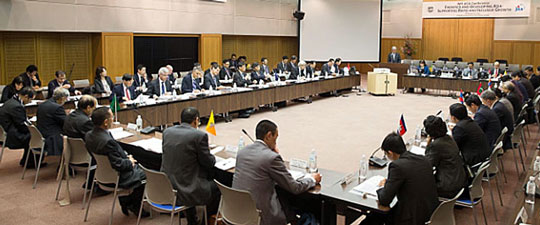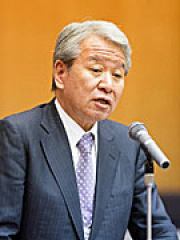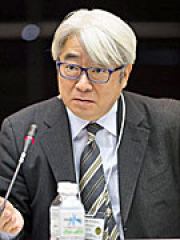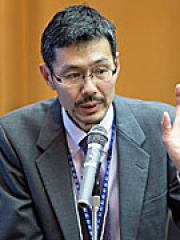The International Monetary Fund and the Japan International Cooperation Agency held a conference in Tokyo on Feb. 18 entitled “Frontier and Developing Asia: Supporting Rapid and Inclusive Growth.”
JICA and the IMF have jointly organized conferences several times. One in October 2011 was entitled "Sustaining Development in Low-Income Asia: Infrastructure Investment and Financial Sector Development" and one in January 2013 was entitled “Frontier Asia: Economic Transformation and Inclusive Growth.” For these conferences, both organizations brought substantive analytical studies and working papers, and financial officials from low-income countries in Asia were also invited.
At this third conference, the IMF dubbed emerging low-income countries in Asia “Frontier and Developing Asia.” Together with JICA, the IMF invited ministers from Finance ministry and Development related ministries, central bank governors, and concerned officials, from Bangladesh, Bhutan, Cambodia, Laos, Maldives, Mongolia, Myanmar, Nepal, Sri Lanka, and Viet Nam, and deepened discussions on the issues related to economic growth in each country.
From the organizer’s side, Naoyuki Shinohara, deputy managing director of the IMF, Changyong Rhee, director of the IMF’s Asia-Pacific Department, Akihiko Tanaka, president of JICA, and Kiyoshi Kodera, vice president of JICA, participated in the conference. Masatsugu Asakawa, director-general of the International Bureau of the Ministry of Finance, Japan, and Naoyuki Yoshino, dean of the Asian Development Bank Institute (ADBI), also spoke.

Approximately 30 people from 10 Asian countries participated in the conference.
Emphasizing the Importance of 'Quality Growth'

Akihiko Tanaka, president of JICA, emphasizes the importance of “quality growth” to disparity reduction in Asia.
During his opening remarks, Tanaka said, “Monetary and fiscal soundness and development provide a firm foundation for tackling the financing challenge ahead of us. At the same time, it offers an enabling environment for redistributive measures and the provision of social services to fight against inequality.”
He also said that “...to realize ‘quality growth,’ it is important to incorporate into the new set of international development goals and targets the three concepts of inclusiveness, resilience, and sustainability.”
Shinohara said that the income gap is widening in many frontier and developing countries in the Asian region. He pointed out that an increase in income inequality is harming stability and growth of the macro economy while the Gini coefficient (1) has risen an average of three points in the Asian region. He suggested that fiscal policy, deepening the financial sector (2) and financial inclusiveness (3) will be effective.

Naoyuki Shinohara, deputy managing director of the IMF, points out a widening income gap in Asia.
Masatsugu Asakawa, director-general of the International Bureau of the Ministry of Finance, Japan, said, “It is not easy to achieve rapid and inclusive growth in a sustainable way, but it is worth trying.” On that basis, he emphasized that the key factors to promote private investment and create new employment by 1) investing in high-quality infrastructure and improvement of the business environment through building taxation management system, and 2) fostering productive and diligent workers through investing in public health and education.
The discussions of the conference centered on two themes, “inclusive growth” and “strengthening capital and financial markets.” The IMF presented the results of empirical analyses for both issues. The ADBI gave a presentation on “inclusive growth” and the JICA Research Institute presented on another theme, “strengthening capital and financial markets.” After the presentations, representatives of Asian frontier countries made remarks on each theme.

Masatsugu Asakawa, director-general of the International Bureau of the Ministry of Finance, Japan, talks about the experiences of Japan’s inclusive growth.
Inclusive growth and promoting fiscal sustainability
For the first theme, “inclusive growth,” the IMF gave a presentation on “Promoting Fiscal Sustainability.” While poverty in Asian countries has been greatly reduced, income gaps have been widening. On the other hand, the redistributive function of fiscal policy is limited by a shortage of income and social expenditures, particularly in low-income countries, according to the IMF's analysis. To design effective and efficient financial policy, the IMF suggested the necessity of 1) consistent macroeconomic policy in each country, 2) study of the effectiveness of redistribution on the whole through taxation systems and social expenditures, and also 3) taking administrative capacity into consideration. As there are many countries where subsidies on energy and other things exceed expenditures for education and health, it is possible to increase redistributive effects by prioritizing social expenditures in the allocation of resources by reforming the subsidies, the IMF explained.

Kiyoshi Kodera, vice president of JICA, summarizes discussions on the income gap and financial policy.
As a response to the points above, participants discussed: 1) the importance of financial sector policies such as financial inclusion using mobile phones, 2) conditional cash transfer, 3) the need for system design on domestic resource mobilization, corresponding to the situation of each country, and 4) the design and introduction of policies for both economic growth and disparity correction.
Promoting small and medium enterprise development
The ADBI made a presentation on “Promoting small and medium enterprise development” for the first theme, “Inclusive growth.” Small to medium-sized enterprises are responsible for a large portion of labor absorption and they are an important sector for inclusive growth. However, financial access, portion in the supply chain and a presence in export market are issues that need to be resolved, according to ADBI's analysis. The ADBI pointed out that in Asia, which has a bank-centered financial system, while the degree of difficulty of financing small and medium enterprises has been raised by introduction of the Basel III, there is a deficiency in capital markets, institutional investors and venture capital. As countermeasures, the ADBI said there is a need for credit enhancement through guarantees, the creation of a credit information database of small to medium-sized enterprises for a credit rating and financial education, taking the Hometown Investment Trust Fund as an example.

Azeema Adam, governor of the Maldives Monetary Authority, participated.
Following the presentation, opinions were exchanged on 1) system design for the introduction of guarantees/credit ratings, 2) the need for technical cooperation on administration/accounting knowledge toward small to medium-sized enterprises, 3) inducing investments with higher social and environmental returns through guidance policy finance based on the notion of inclusive finance and 4) promoting the usage of the information and communication technology (ICT).
Dollarization and de-dollarization

Ken Odajima, executive senior research fellow of the JICA Research Institute, talked about de-dollarization.
The JICA Research Institute and the National Bank of Cambodia made a presentation on “Dollarization or De-Dollarization?” for the second theme, “Strengthening capital and financial markets.” It was pointed out that de-dollarization, which is important for the development of national financial markets, is one of a common issues in Asian countries including Cambodia. For de-dollarization policy in Cambodia, a survey was conducted on behavioral factors such as households, companies and commercial banks. It was confirmed that the rate of dollar usage was high in urban areas, regions with vigorous trade, and for top earners, large enterprises, salaries and payments for high price products. It was also confirmed that dollarization was remarkable in the financial sector, and the local Riel currency was mainly used in small to medium-sized enterprises and regions other than urban areas. The presentation highlighted the importance of market principles proceeding with de-dollarization and promoting use of local currency and the significance of enhancing payment system for trades at the same time as currency and exchange policy.
Issues raised included 1) causes of dollarization and its driving forces or sectors, 2) obstacles to local currency usage, 3) policy steps for promoting the use of local currencies and 4) appropriate timing for implementing de-dollarization policies.
Then, discussion covered the similar situations in Laos and Mongolia, such as the causes of dollarized economies, crucial policies for de-dollarization, their de-dollarization process, the pros and cons of a dollarized economy, the expanded use of foreign currencies and complications caused by changes of trading partners.
How can finance help Frontier Asia meet infrastructure needs and demographic challenges?

Naoyuki Yoshino, dean of the ADBI, concludes a discussion on infrastructure financing.
For the second theme, “Strengthening capital and financial markets,” the IMF made a presentation on “How finance can help Frontier Asia meet infrastructure needs and demographic challenges.” Each low-income country in Asia will reach a period of demographic dividend in the next 20 to 30 years. It is estimated that increases in growth, savings and investment can be expected for the coming decades, but they will not fulfill the US$ 8 trillion of infrastructure needs in Asia. As crucial countermeasures to fulfill the need for internal and external resource mobilization, three points were raised: financial deepening, financial inclusiveness and financial integration (4). In addition, discussions went also on to include obstacles to financial integration, pros and cons, and policies for promoting investment in Asia by institutional investors.
Furthermore, participants exchanged opinions on effective use of the resources that have been already mobilized in low-return assets ; the need to develop such products as credit enhancement, securitization and hedging while fostering capital markets and organizational investors; the risks of financial integration in small countries; and the importance of introducing long-term investments and systems for education and infrastructure.
Donors' role is to support policy formulation

Changyong Rhee, director of the Asia and Pacific Department of the International Monetary Fund, makes closing remarks.
In his closing remarks, JICA Vice President Kiyoshi Kodera said, “The first crucial step is to implement income redistribution principle of fiscal policy that the IMF has indicated. The role of we donors is offering support for smooth implementation. It is essential to consider the political, economic and social background. As for inclusive growth, social investments such as in public health and education are also essential. Mineral resource rich countries should allocate their earnings for education and financial sector development. And for island countries and landlocked countries, more concessional (5) resource and technology innovation should be considered.”
Changyong Rhee, director of the Asia and Pacific Department of the IMF, concluded, “This conference is useful for the IMF to play a crucial role in supporting inclusive growth in Asian and Frontier countries. IMF would like to make use of the results of today’s discussions for individual negotiations with each country.”
JICA will continue its policy dialogues based on empirical study, toward sustainable growth of Asian low-income countries and the realization of inclusive societies in cooperation with partners, including the IMF.
Notes:
- 1 . “The Gini coefficient” refers to an index that shows the income gaps of countries and regions around the world.
- 2 . Financial deepening refers to a process of enhancing and expanding financial system and its methods: 1) increasing fluidity of financial organizations and markets, 2) improving effectiveness, 3) increasing capacity, 4) diversifying domestic procurement funds and 5) enhancing access to banks and other financial services.
- 3 . Financial inclusiveness refers to solving the problems of access to basic financial services so people can receive such services.
- 4 . Financial integration refers to the liberalization of domestic financial services, the liberalization of capital trade, the maintenance and integration of capital markets and the maintenance of payment systems.
- 5 . “Concessional” refers to a status which is lower than general market interest rate.




scroll